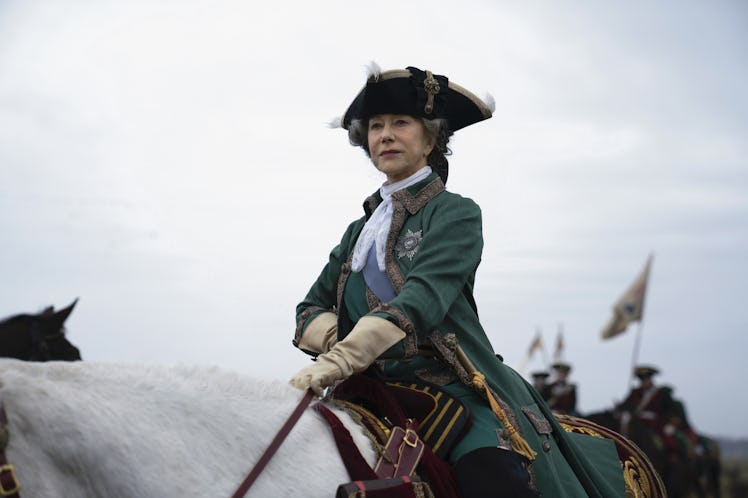
Let's Break Down All The Historical Moments In 'Catherine The Great' Episode 1
HBO's first collaboration with Sky yielded the stunning Chernobyl series. The show took home three Emmys and was highly praised for its historical accuracy. Now, the second series from this team-up has arrived, another miniseries based in Russian history, Catherine The Great. Starring Helen Mirren as the titular empress, the series begins just as her son and heir, Paul, comes of age. But is Catherine The Great based on real events, the same way Chernobyl was? Warning: Spoilers for Catherine The Great follow.
Born Princess Sophie of Anhalt-Zerbst, Catherine became Empress of Russia in 1762 at the age of 33. Her rise to power was not orthodox, to say the least. She was married to the presumed Tsar-to-be, Peter, at the age of 16. When he finally inherited after a decade and a half of marriage, she politely waited six months before staging a coup, having him assassinated, and taking power herself.
Paul was eight-years-old at the time of his mother's rise to power. Some would have thrown her out as a usurper but were held at bay by the (incorrect) assumption she was merely her son's regent. Catherine did her best to battle the impression she was anything but empress. But the theory went when Paul turned 16 in 1770 he would become Tsar.
When Catherine The Great opens, it's the day of Paul's coming-of-age ceremony, and the rumblings that the empress won't be stepping down are hitting a fever pitch. Palace advisor Panin is pouring poison into Paul's ear that he should be inheriting. Meanwhile, Catherine's current lover, Grigory Orlov, has realized, eight years into having helped her to the throne, that she's not marrying him. He and his brother Alexei insist they made her, and they can unmake her as empress just as quickly. Her response is to dump Orlev.
Besides, Catherine has her eye on a different danger. Vasily Mirovich, who is the main guard over "Prisoner #1," is spreading dissent. She smells a coup, using his charge as a rallying point.
All these things are historically accurate, but the timing has been slightly fudged.
For one, Catherine dumped Orlev for good in 1774. She then took up with Grigory Potemkin, who she is introduced to in the premiere episode, and clearly would like to bed.
As for the coup, "Prisoner #1" was Ivan IV, who was Emperor of Russia for 13 months when he was a baby in 1740. He spent his life imprisoned after his ineffectual regent mother was deposed. Mirovich did attempt to use him as a rallying point to overthrow Catherine, and the prison guards slaughtered Ivan in response. (The Palace had ordered this, in the event someone attempted to use him in a coup.) But that happened in 1764, two years after Catherine took the throne, not in 1770.
So why change it? Though rumblings grew when Paul came of age, Catherine easily squashed any thought of using her son to overthrow her. By staging the real coup that happened six years before to coincide with Paul's birthday, and having Orlev's threats come at the same time, Catherine The Great gives teeth to the idea she was always battling those who would see her fall.